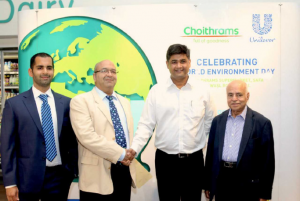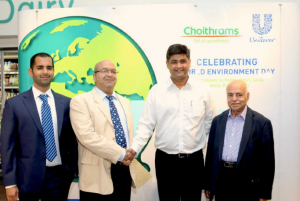FMCG giant and retailer to continue collaboration on cutting plastic waste and optimising water and energy use
 Dubai Unilever has renewed its environmental sustainability partnership with retail chain Choithrams, which operates 37 stores in the UAE.
Dubai Unilever has renewed its environmental sustainability partnership with retail chain Choithrams, which operates 37 stores in the UAE.
On World Environment Day, 5 June, Unilever and Choithrams said they would continue to collaborate on reducing and recycling plastic waste and optimising water and energy use.
In a 14-day campaign consumers will receive recycling and water conservation tips and shoppers will gain rewards from buying water-saving products from brands such as Lifebuoy, Lux, Comfort Concentrates, and Lux Sunlight dish wash.
Choithrams customers spending over AED25 on any Unilever water-saving product will be eligible for rewards including washing machines and DEWA utility bill subsidies of up to AED500 through scratch-and-win coupons. Additionally, 40,000 green bags will be distributed to shoppers at Choitrams’ 15 key branches in Dubai.
Unilever’s Sustainable Living Plan aims for the business to expand without increasing its environmental footprint proportionally. The plan aims for cost savings by reducing the environmental impact of operations.
“Our four-year partnership with an impactful retailer like Choithrams is an example of successful alliances in reducing environmental footprint in the region,” said Gaurav Rustagi, Unilever’s country director for UAE and Oman.
“Fruitful manufacturer and retailer collaborations are pivotal within this construct in achieving substantial results. Our Sustainable Living brands combine a strong social and environmental purpose with products that provide consumers tools to minimise their environmental footprint by simply using them.”
At the start of the year, Unilever committed globally to ensuring that all its plastic packaging is fully reusable, recyclable, or compostable by 2025 as it called on the entire FMCG industry to accelerate progress towards a circular economy.
According to the Ellen MacArthur Foundation (EMF), just 14% of the plastic packaging used globally makes its way to recycling plants, while 40% ends up in landfill and a third in fragile ecosystems. By 2050, it is estimated there will be more plastic than fish in the world’s oceans.



